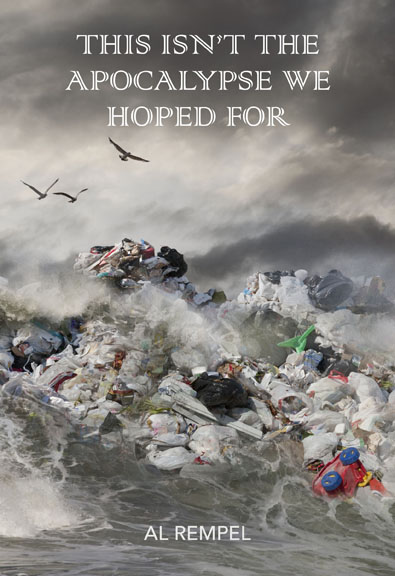By Katie Stobbart (The Cascade) – Email
Print Edition: April 2, 2014
Three seagulls coast over a literal sea of garbage. Is that a child’s wagon receding with a wave? It drifts, upended, at the base of a trash-bag mountain. A ridge of foam away, what looks like a tiny red paper crane is only the ties of another plastic bag knotted together.
Welcome to Al Rempel’s newest book, This Isn’t the Apocalypse We Hoped For. Despite the sharp commentary of the image, the collection of poems doesn’t start with accidental plastic origami or even garbage. It begins innocuously with lunch, then moves on to bananas.
Yes — bananas, in all their glorious banality. “We Love Bananas” is the title of the poem. Their familiarity is comforting, yet after reminding us of Tarzan and still lifes and Curious George, Rempel gently points out what often happens to the things we love: “we forget to eat them and they go / soft. we put them on the top shelf in the freezer. / we throw them out when we can’t fit / the box of pizza in. we’ve already bought more.”
Poetry doesn’t get much more accessible than that, and this approach echoes throughout the collection. Rempel gives us the familiar and allows us to fill in the blanks.
For example, the first line in “Survival Kit” is “a plastic straw” because, the poem says, we “keep everything, or nearly, because you never know.” The narratives of everyday hoarding, “purses spilling out eyeliners, / pocket squares of envelopes … desktops awash in icons” are laid out as potential necessities. We know we don’t really need these things, yet we keep making them, filling ourselves up with them. There is tension between the title and the list — what is missing?
“One of the threads running through this book is our consumption and the anxiety it produces,” Rempel said in an interview with Rob Taylor.
This feeling of anxiety is, in part, a result of the poems’ unwritten questions. Because of this, you might say the book seldom seems apocalyptic. Exactly. Where we often use the word “apocalypse” to refer to the end of the world, that’s not necessarily so. “Apocalypse” is derived from a Greek word meaning “to uncover.” The apocalypse is a revelation.
“This” — the way we live and operate today, the image of the trash heap — is our necessary revelation. It isn’t, Rempel says in the title, what we hoped for. Unfortunately, our revelation does not exclude the biblical, end-of-the-world connotations of the word. The things to which we have attached ourselves are things we don’t need; the way we live is not sustainable.
“Who cares,” Rempel writes in “Half-past Christmas,” “when those every year mandarin oranges / arrive in daily shipments, when rows / and rows of frozen turkeys appear / their giblets and necks neatly tucked in?”
One of the strengths of this collection is its approachability. In easy-to-unpack language, Rempel negotiates both human and natural landscapes and their intersections.
In “Xylophobia,” he makes suggestions to reconcile an irrational fear of the forest. Air travel is best — there is a feeling of relief and control in that distance, and if you wake from a nightmare, “imagine the trees pressed square and clean / into a climate-controlled mall.” (Ah, that’s better.)
There are so many other gems in here, poems that deserve attention. “Urban Dreams,” “Have a Bath,” “Table Setting for Six,” and “On the Porch” were some of my other favourites. There’s local flavour here too (“Huntingdon Man”). Of interest, the editor of This Isn’t the Apocalypse We Hoped For is UFV’s former writer in residence, Elizabeth Bachinsky. If you enjoyed her Home of Sudden Service, Rempel’s collection would be another good addition to your bookshelf.


